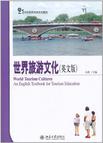世界旅游文化
出版时间:2011-7 出版社:北京大学 作者:冯源 编 页数:120
Tag标签:无
内容概要
由冯源编著的《世界旅游文化(英文版)》由海南大学旅游学院组织编写,内容分为四章,涉及指导理论、世界旅游大国介绍、旅游经济与旅游文化、世界遗产。每章4个单元,共16个单元。每个单元包括主要阅读材料、难点解释、讨论题、作业,以及拓展性附加读物。参照教育部对双语课程教材的要求,《世界旅游文化(英文版)》的资料选自联合国教科文组织、世界旅游组织、世界博览会以及有关国家的官方英文文献。
《世界旅游文化(英文版)》适合英语能力达到大学英语四级以上水平的旅游管理、旅游英语、商务英语、国际导游、酒店与旅行社管理等专业的学生使用,适合旅游管理专业研究生专业英语课程使用,也可供旅游从业人员和政府有关部门官员培训使用。《世界旅游文化(英文版)》对读者通过用英语学习专业知识来提高英语应用能力,成长为旅游业国际型双语人才非常实用。
作者简介
冯源,女,美国华盛顿大学跨文化教育和双语教育哲学博士。曾在波士顿大学执教,在跨文化教育、双语教育、外语教育等领域担任硕、博研究生导师。2001年初从波士顿大学辞职归国,到海南大学执教,现任海南大学外国语言学及应用语言学学科负责人,该校旅游学院语言与跨文化交际研究所所长。社会兼职海南省翻译协会会长、中国翻译协会理事、中美比较文化研究会常务理事。主要从事比较文化、跨文化交际、双语教育、外语教育等方面的教学与研究。近年的学术成果主要有《博鳌亚洲论坛成员国与中国海南旅游资源互补研究》(主编)(当代中国出版社,2011.6)、《语言翻译翻译教学》(主编)(南方出版社,2010)、《简明中餐餐饮汉英双解辞典》(主编)(北京大学出版社,2009)、《“博鳌亚洲论坛”成员国国情及对华关系》(主编)(民族出版社,2003)等。
书籍目录
Chapter Ⅰ guiding theories
Unit One what is tourism culture?
Unit Two global code of ethics for tourism
Unit Three quebec declaration on ecotourism
Unit Four hainan declaration
Chapter Ⅱ leading countries in tourism business
Unit Five europe
Unit Six the americas
Unit Seven africa
Unit Eight the asia-pacific region
Chapter Ⅲ tourism economy and tourism culture
Unit Nine beijing olympics and tourism culture
Unit Ten shanghai expo and tourism business
Unit Eleven cases studies
Unit Twelve creativity and innovation in tourism
Chapter Ⅳ world heritages
Unit Thirteen world natural heritage
Unit Fourteen world cultural heritage
Unit Fifteen dual world heritage
Unit Sixteen intangible cultural heritage
References
章节摘录
版权页:1.formulate national, regional and local ecotourism policies and development strategiesthat are consistent with the overall objectives of sustainable development, and to do so througha wide consultation process with those who are likely to become involved in, affect, or beaffected by ecotourism activities;2. guarantee-in conjunction with local and indigenous communities, the private sector,NGOs and all ecotourism stakeholders-the protection of nature, local and indigenous culturesand specially traditional knowledge, genetic resources, rights to land and property, as well asrights to water;3. ensure the involvement, appropriate participation and necessary coordination of all therelevant public institutions at the national, provincial and local level (including the establishmentof inter-ministerial working groups as appropriate) at different stages in the ecotourismprocess, while at the same time opening and facilitating the participation of other stakeholdersin ecotourism-related decisions. Furthermore, adequate budgetary mechanisms and appropriatelegislative frameworks need to be set up to allow implementation of the objectives and goals setup by these multistakeholder bodies;4. include in the above framework the necessary regulatory and monitoring mechanisms atthe national, regional and local levels, including objective sustainability indicators jointly agreedwith all stakeholders and environmental impact assessment studies to be used as feedbackmechanism. Results of monitoring should be made available to the general public;5. develop regulatory mechanisms for internalization of environmental costs in all aspectsof the tourism product, including intemational transport;6. develop the local and municipal capacity to implement growth management tools suchas zoning, and participatory land-use planning not only in protected areas but in buffer zonesand other ecotourism development zones;7. use internationally approved and reviewed guidelines to develop certificationschemes, ecolabels and other voluntary initiatives geared towards sustainability in ecotourism,encouraging private operators to join such schemes and promoting their recognition byconsumers. However, certification systems should reflect regional and local criteria. Buildcapacity and provide financial support to make these schemes accessible to small and mediumenterprises (SMEs). In addition, monitoring and a regulatory framework are necessary tosupport effective implementation of these schemes.
编辑推荐
《世界旅游文化(英文版)》是21世纪旅游英语系列教材之一。
图书封面
图书标签Tags
无
评论、评分、阅读与下载
用户评论 (总计2条)
- 很好,适于英语学习,能够提高对英语的学习兴趣,顺便能够了解世界各地的旅游文化,在书中感受旅游的魅力
- 作者的视野比较宽, 这本书的选篇角度与其他中文版的教材不同, 有新意
